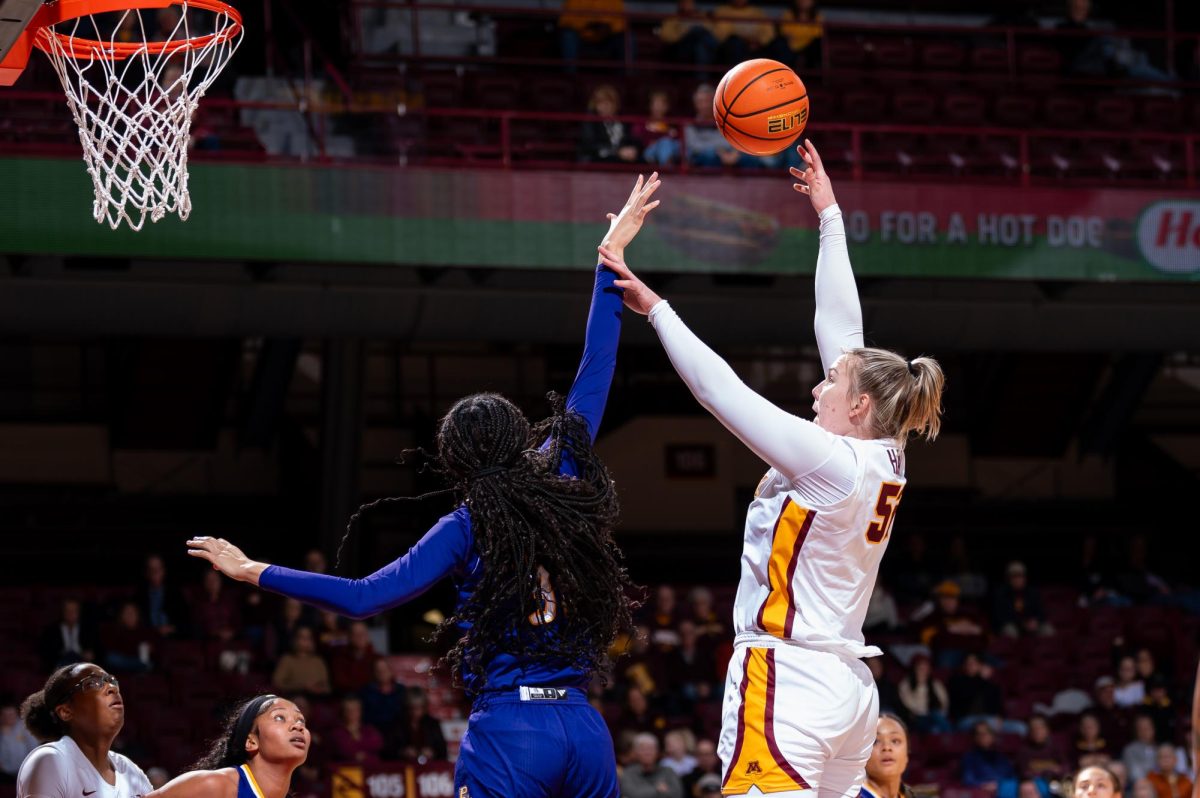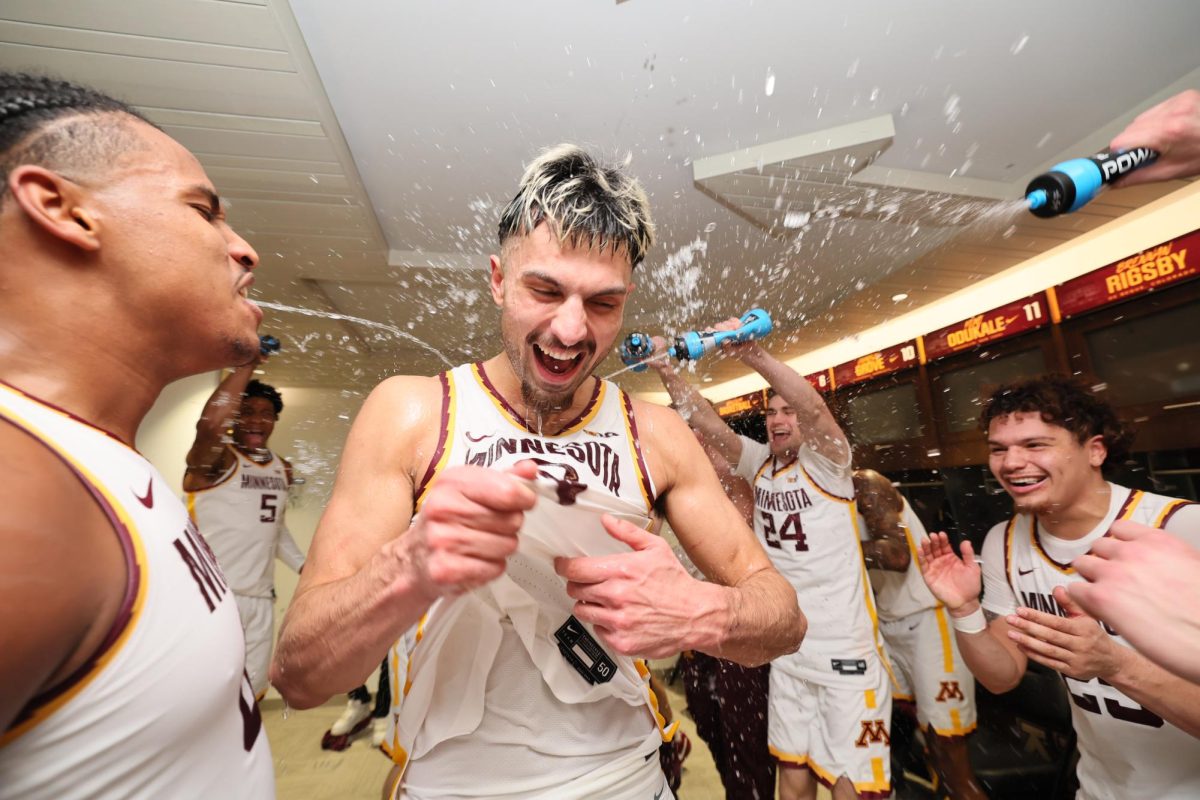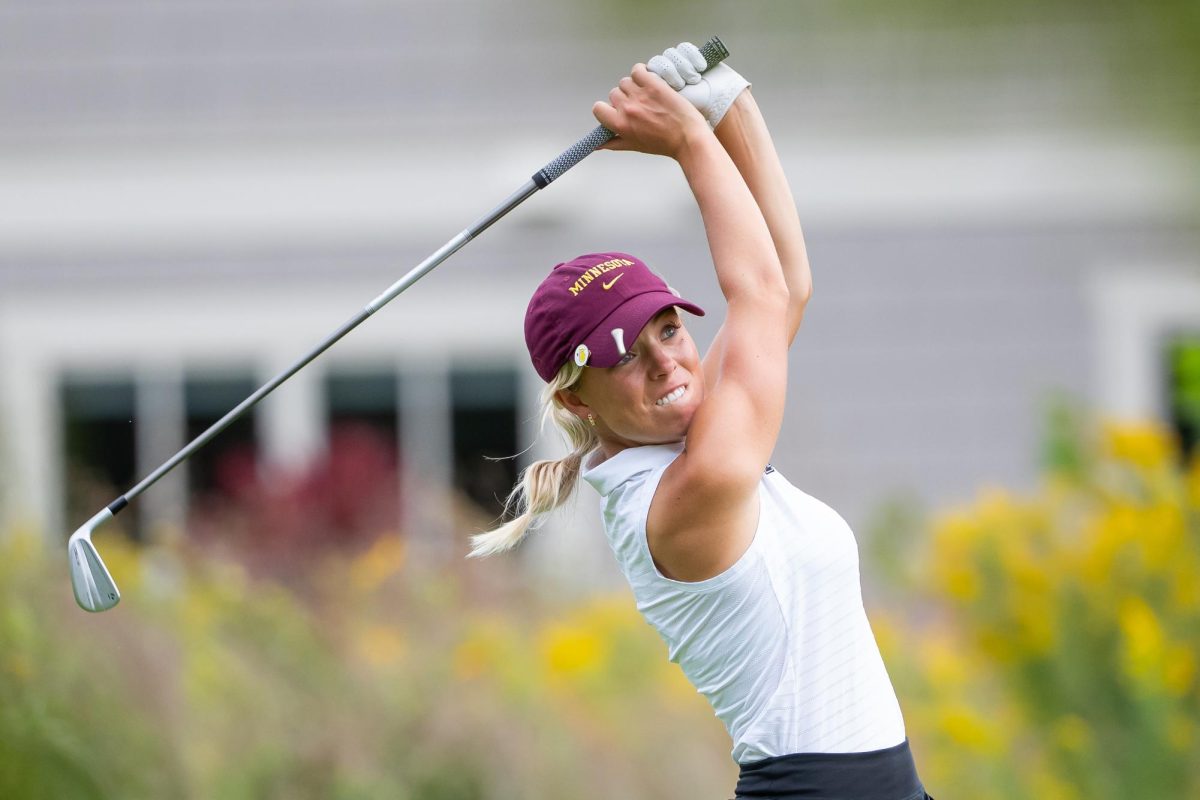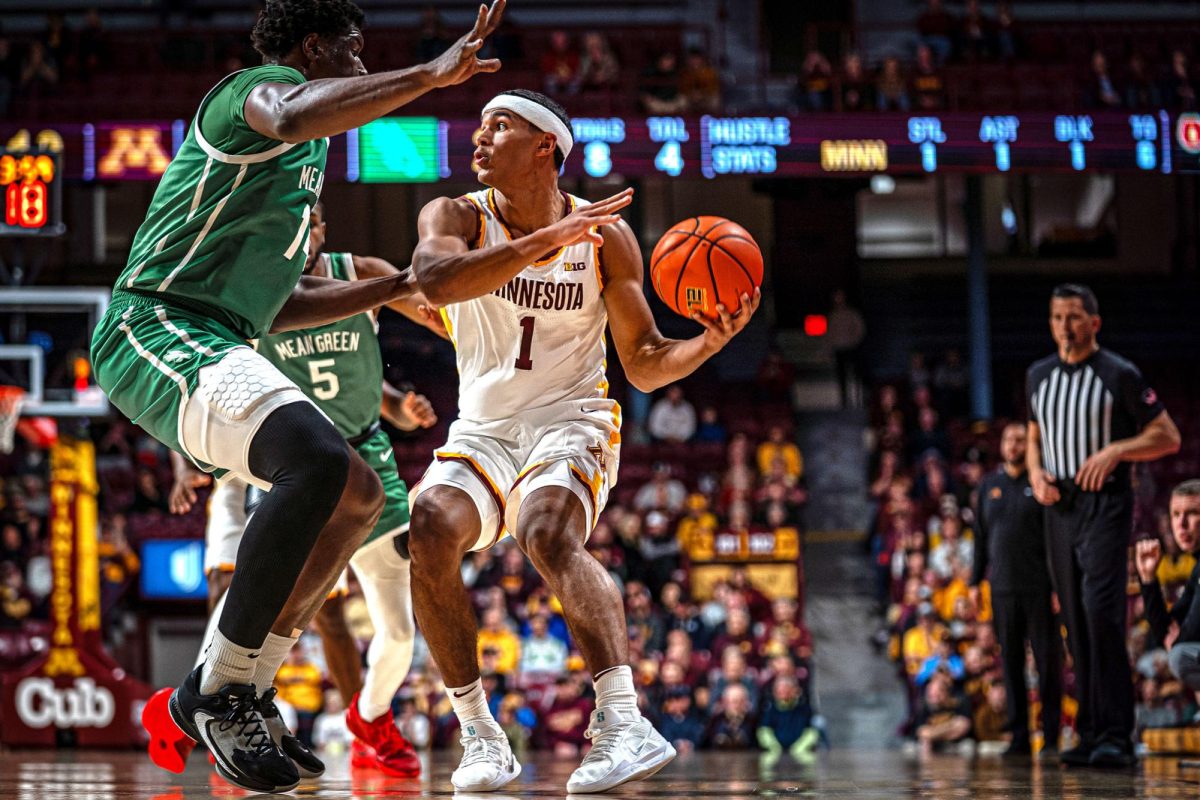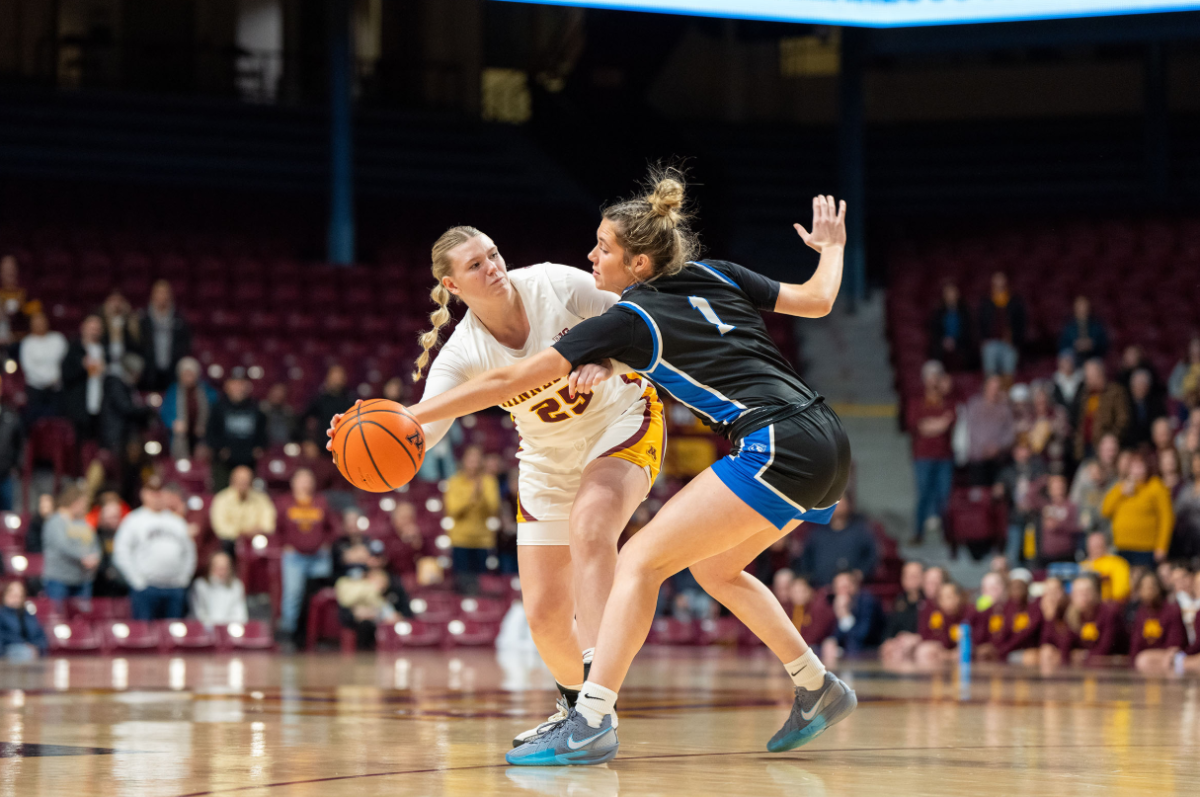A few years ago, Ben Clymer was in the thick of the NHL playoffs.
Currently, he is in the midst of a very different kind of stress: finals week.
Clymer returned to school full time in fall 2011 to finish his undergraduate degree after he left the University of Minnesota and the Gophers men’s hockey team early to play professional hockey.
“There are times when I sit on campus and think, like, gosh there’s so much I missed out on leaving school early,” Clymer said. “But on the other side of it, I’m so happy with where my career went that it’s tough to really look back and regret that decision.”
Clymer’s professional hockey career spanned 13 years, nine teams, four countries and included one Stanley Cup trophy.
With his success on the ice, returning to school was not a financial necessity. His name recognition alone could have likely earned him a job.
Clymer said his reason for graduating is more about setting an example for his family. He and his wife Sarah have two sons, 2-year-old Brendan and Colin, who was born over spring break.
“Originally when I left school, I told my parents, ‘Look, I’ll come back and finish school,’” Clymer said. “Really … I don’t want [my kids] to say ‘Well, my dad played hockey or my dad won the Stanley Cup,’ like that’s an excuse to not go to school because it’s really not.
“I think it’s important to be a good dad and be a good role model for them to show them the importance of school and not just say, ‘Do as I say and not what I do,’” Clymer said.
Back to school
Clymer’s professional hockey career ended abruptly. He injured his knee in a training camp for a Swiss team, HC Lugano, and had surgery in October 2010.
Although he attempted to play again that spring while on a one-year contract with a German team, ERC Ingolstadt, he could not skate without pain and officially retired in June 2011.
“It’s probably a lot like going through a death … effectively, that part is over,” Clymer said. “The decision [to retire] was made for me … It was difficult mentally to accept that.”
He said he then had to decide what to do next with his life, and he settled on finishing his education.
Clymer contacted the hockey department at the University that referred him to the Gopher Graduation program.
The athletic department created the program about five years ago, senior associate athletics director Regina Sullivan said. Its purpose is to actively seek former student-athletes who left school before finishing their degrees and support them in their return to school.
The support for former Gophers student-athletes ranges from financial aid to the use of tutoring and advising services through the McNamara Academic Center for Student-Athletes.
Clymer has become one of approximately 50 athletes to join the program since its inception, Sullivan said.
“[Ben] is a highly motivated person that has already almost worked a lifetime in a professional career,” Chris Cords, Clymer’s academic counselor, said. “I don’t think Ben realizes how well he’s doing and how well he’s done in coming back.”
Clymer came back to school focused on obtaining a business degree, and his first step was applying to the Carlson School of Management.
Besides taking math courses he had not encountered since his teenage years, Clymer also had to find someone to write a letter of recommendation.
He found a pretty impressive candidate in Ted Leonsis, the owner of the Washington Capitals, where Clymer played for two seasons.
“I find him to be highly intelligent, highly curious, very disciplined and focused, which are traits that you look for not just in a player, but in a business partner — an entrepreneur,” Leonsis said. “When he told me he wanted to go to business school … I thought that made an incredible amount of sense.”
When Clymer decided to return to school, he contacted Leonsis, a successful businessman for companies like AOL and Groupon, for advice and, eventually, the recommendation.
Clymer is now set to graduate with a degree in finance or accounting in December 2013.
Even with his degree, Clymer wants to stay involved in hockey. He said he is interested in working for Octagon, the agency that represented him during his professional career. He is also considering a broadcast career after his experience commentating for this year’s high school state hockey tournament.
Playing days
Although he’s sure of his educational path this time around, Clymer admits it wasn’t as clear the first time through.
“I was amazingly undecided,” Clymer said. “I truly had a passion to play hockey, and that’s what I really wanted to do.”
Clymer was one of the first players that associate head coach Mike Guentzel recruited for Minnesota. The Bloomington Jefferson High School standout defender only played 30 games with the Gophers before he moved to the professional ranks.
“It was a blow to our program because you lose a high-level player,” Guentzel said. “But, you know, that was Ben. He was chasing a dream, and he was passionate about being a pro hockey player.”
Clymer immediately made an impact on the Gophers his freshman season in 1996-97. However, an ear infection that affected his balance forced him to miss a month of the season.
He played one game his sophomore year before he injured his shoulder and had surgery, which ended his season.
“That was a tough situation,” Guentzel said. “I think that’s at the time where Ben started to say, ‘Maybe there’s a ways and a means for me to get more ice time and more opportunity to develop my game.’ And he decided maybe the best thing for him was to go [professional].”
Clymer left school and his three remaining years of eligibility behind. In 1997, the Boston Bruins drafted Clymer in the second round.
He first played with the Seattle Thunderbirds in the Western Hockey League, a junior division in Canada. He never officially signed with the Bruins and instead signed as a free agent with the Tampa Bay Lightning in 1999.
After bouncing between the Lightning and its feeder team, the Detroit Vipers, Clymer became a fixture on the NHL side from 2001 to 2004.
In his last season in Florida, the team won its first Stanley Cup.
“It was fulfilling, satisfying, a dream, et cetera,” Clymer said. “It was an incredible time.”
There was not a chance to build off the dream season momentum, as the NHL went into a lockout the next season.
It was during the lockout that Clymer made his first trip to Europe to play in Switzerland’s second division. He returned to the NHL the next season with the Washington Capitals.
He spent two seasons with Washington before the coaching staff decided to send him down to the program’s American Hockey League team, the Hershey Bears, in the 2007-08 season.
It was in the lower division that Clymer met teammate Grant Potulny, a fellow University of Minnesota hockey player, albeit from a different era. Potulny is currently an assistant coach with the Gophers.
With a few years left on his NHL contract with the Capitals, it was surprising to see a seasoned professional sent down to the lower division, Potulny said.
“There’s two reactions, either I’m here to work, or I’m here to be pissed, and Ben was there to work,” Potulny said. “The first day of practice … that he got there he challenged a guy to a fight … and it wasn’t a fight because that guy was bugging Ben; it was a problem because that guy wasn’t trying hard enough, and it bothered Ben.”
Clymer quickly earned his younger teammates’ respect. He and Potulny also soon became close friends and were roommates during away games.
“I’ve got to be honest, Ben would take a lot of the tabs that we’d end up running up,” Potulny said.
Clymer left the Hershey Bears after that season and returned to Europe. He played for HC Dinamo Minsk in Belarus from 2008 to 2009 and then with Ingolstadt in Germany from 2009 to 2010.
A year later, he had injured his knee and retired.
‘Life after hockey’
Although Clymer’s playing time is over, he still impacts the Gophers hockey team.
“From our kids’ standpoint, they’re aware of Ben … they see [him] in the learning center over at Bierman,” Guentzel said. “It’s just a good message for our current players: take care of your business, Take care of your academics — understand it’s a part of the process. The more you do now, the less you’ve got to do later.”
“There’s going to be life after hockey. That may be at 22. It may be at 32,” Guentzel said. “Ben is taking care of life after hockey now.”
Even with a full class schedule and a family to take care of, Clymer still cannot stay away from the ice.
“I see Ben probably once or twice a week up in the far corner [of Mariucci Arena] watching practice,” Potulny said. “I think I might be the only guy who knows he’s there.”



